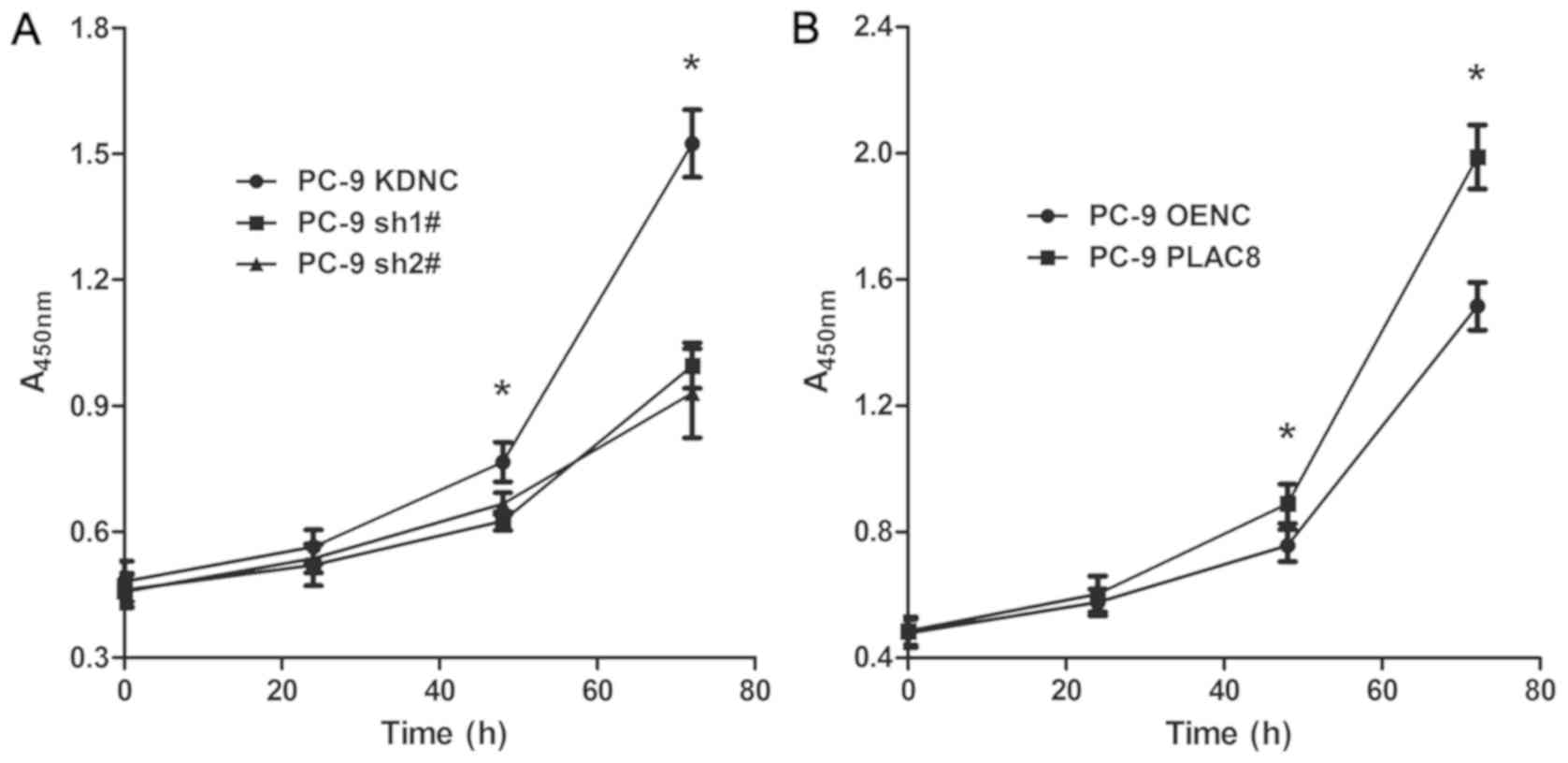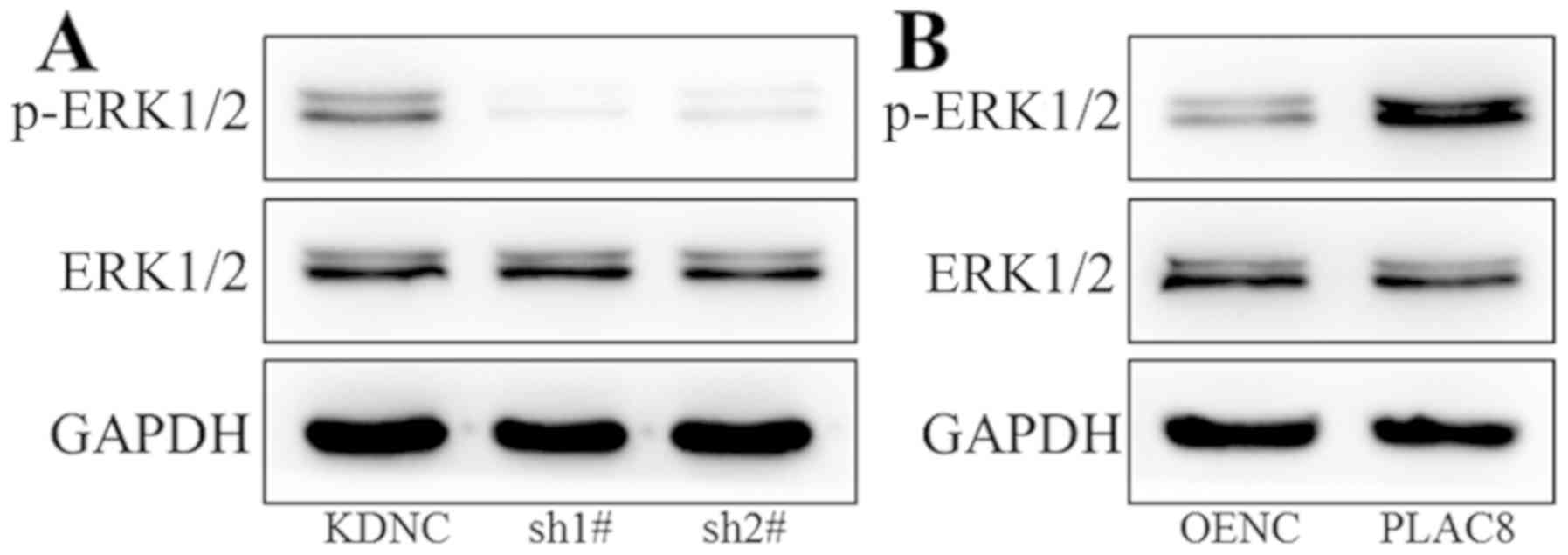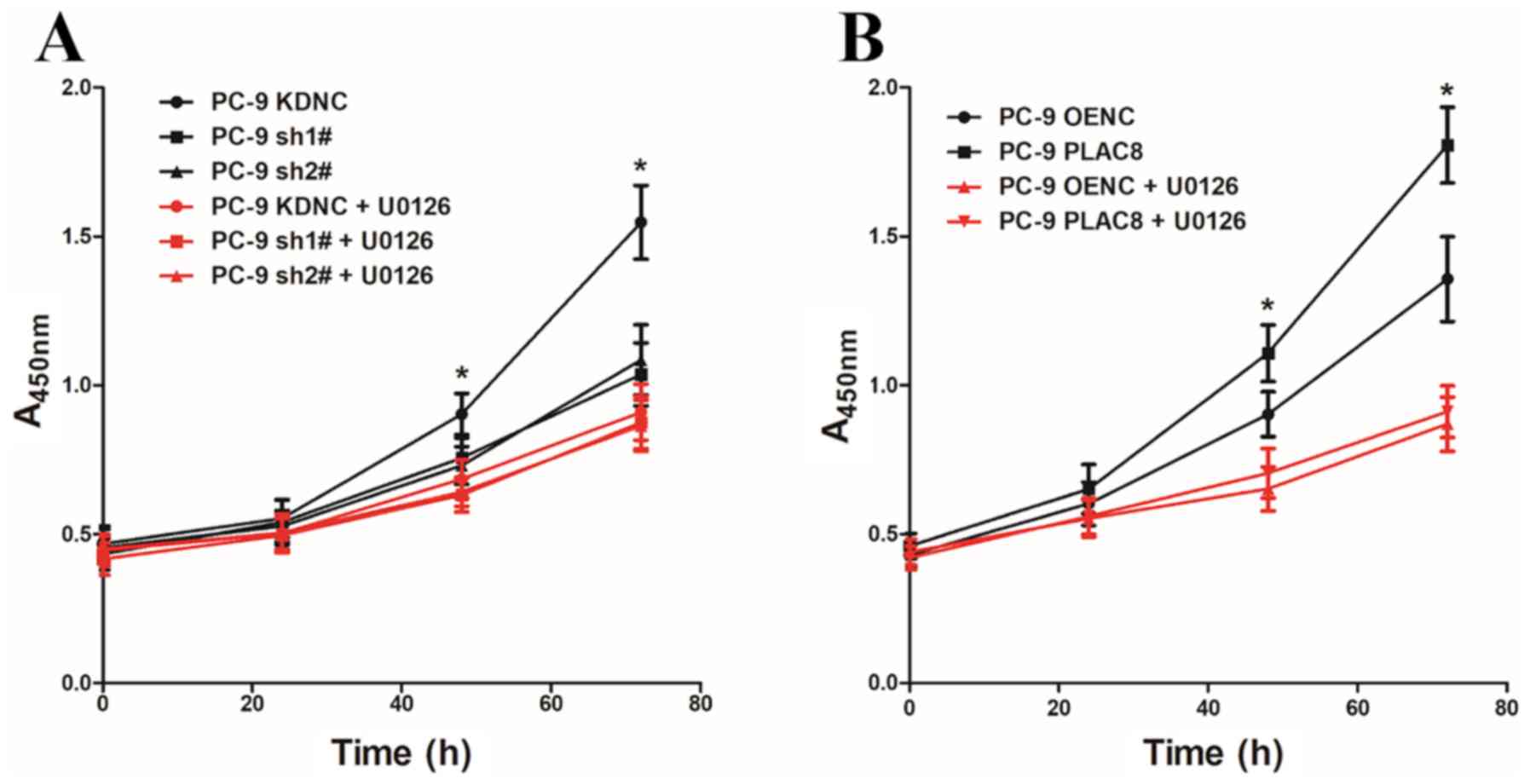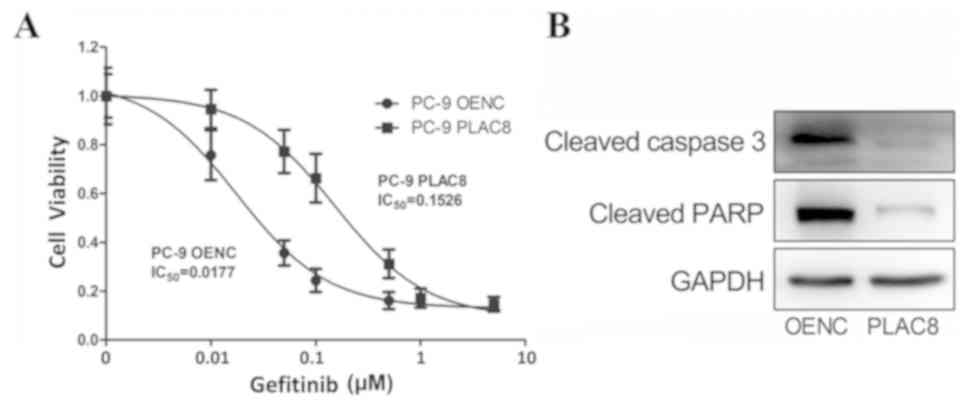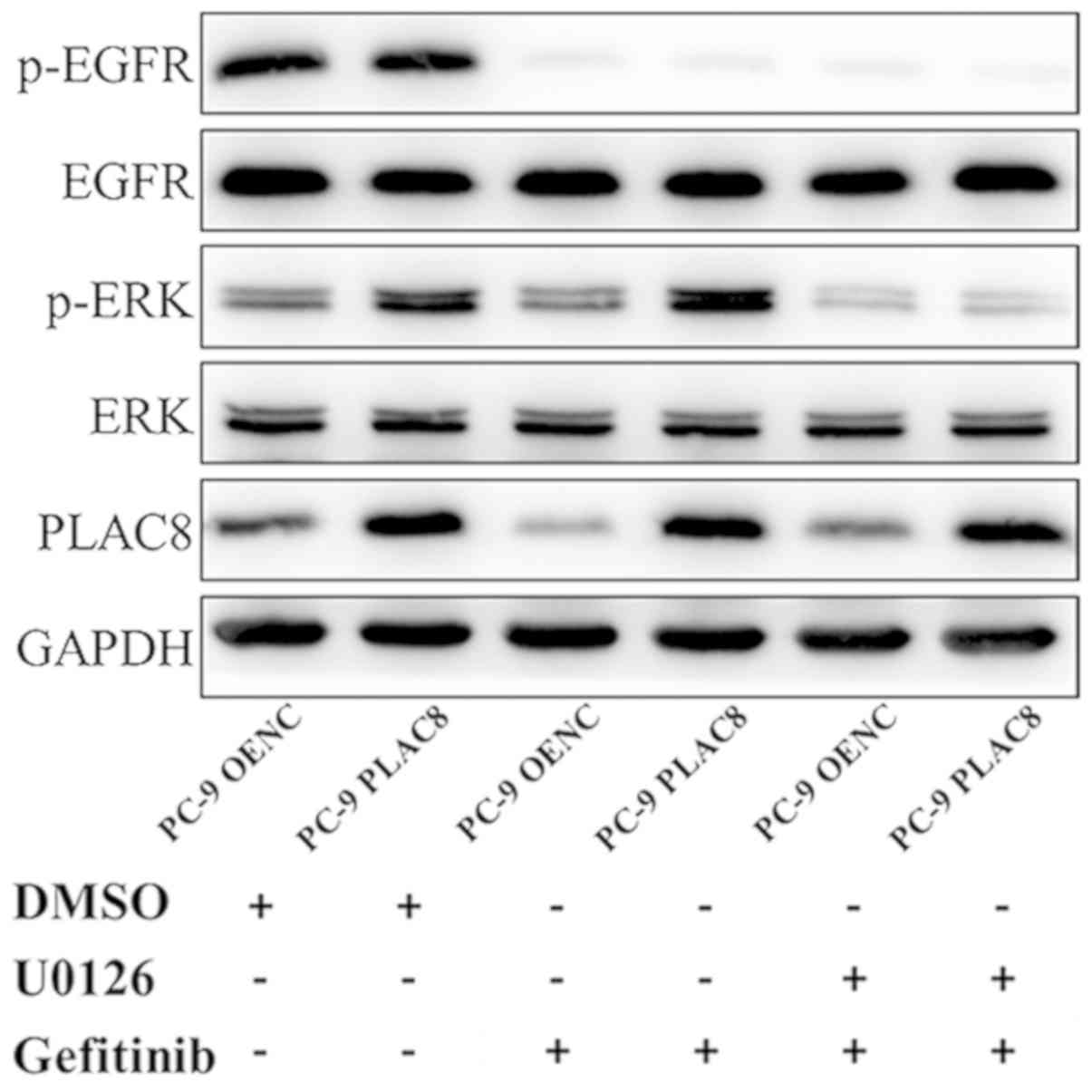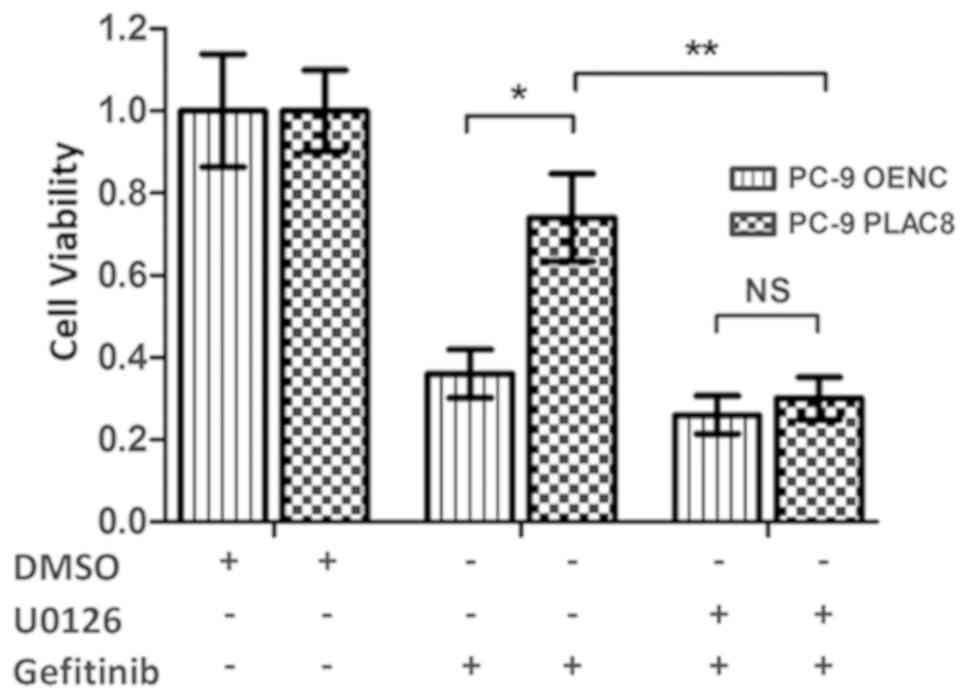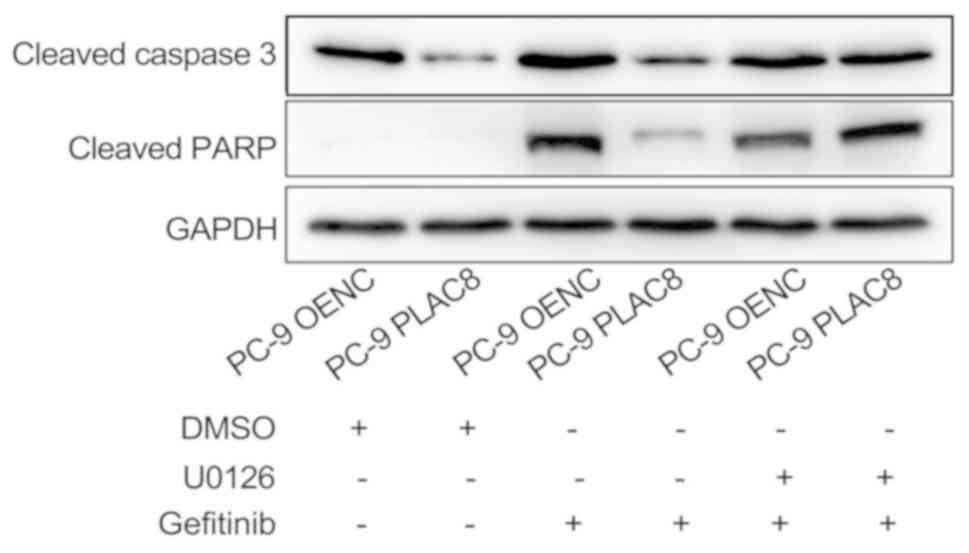|
1
|
Cao M and Chen W: Epidemiology of lung
cancer in China. Thorac Cancer. 10:3–7. 2019. View Article : Google Scholar : PubMed/NCBI
|
|
2
|
Chen W, Zheng R, Baade PD, Zhang S, Zeng
H, Bray F, Jemal A, Yu XQ and He J: Cancer statistics in China,
2015. CA Cancer J Clin. 66:115–132. 2016. View Article : Google Scholar : PubMed/NCBI
|
|
3
|
Imielinski M, Berger AH, Hammerman PS,
Hernandez B, Pugh TJ, Hodis E, Cho J, Suh J, Capelletti M,
Sivachenko A, et al: Mapping the hallmarks of lung adenocarcinoma
with massively parallel sequencing. Cell. 150:1107–1120. 2012.
View Article : Google Scholar : PubMed/NCBI
|
|
4
|
Chen J, Liu X, Xu Y, Zhang K, Huang J, Pan
B, Chen D, Cui S, Song H, Wang R, et al: TFAP2C-activated MALAT1
modulates the chemoresistance of docetaxel-resistant lung
adenocarcinoma cells. Mol Ther Nucleic Acids. 14:567–582. 2019.
View Article : Google Scholar : PubMed/NCBI
|
|
5
|
Dai B, Kong DL, Tian J, Liu TW, Zhou H and
Wang ZF: microRNA-1205 promotes cell growth by targeting APC2 in
lung adenocarcinoma. Eur Rev Med Pharmacol Sci. 23:1125–1133.
2019.PubMed/NCBI
|
|
6
|
Song J, Wang W, Wang Y, Qin Y, Wang Y,
Zhou J, Wang X, Zhang Y and Wang Q: Epithelial-mesenchymal
transition markers screened in a cell-based model and validated in
lung adenocarcinoma. BMC Cancer. 19:6802019. View Article : Google Scholar : PubMed/NCBI
|
|
7
|
Cong Z, Diao Y, Xu Y, Li X, Jiang Z, Shao
C, Ji S, Shen Y, De W and Qiang Y: Long non-coding RNA linc00665
promotes lung adenocarcinoma progression and functions as ceRNA to
regulate AKR1B10-ERK signaling by sponging miR-98. Cell Death Dis.
10:842019. View Article : Google Scholar : PubMed/NCBI
|
|
8
|
Liu C, Li H, Jia J, Ruan X, Liu Y and
Zhang X: High metastasis-associated lung adenocarcinoma transcript
1 (MALAT1) expression promotes proliferation, migration, and
invasion of non-small cell lung cancer via ERK/mitogen-activated
protein kinase (MAPK) signaling pathway. Med Sci Monit.
25:5143–5149. 2019. View Article : Google Scholar : PubMed/NCBI
|
|
9
|
Samatar AA and Poulikakos PI: Targeting
RAS-ERK signalling in cancer: Promises and challenges. Nat Rev Drug
Discov. 13:928–942. 2014. View
Article : Google Scholar : PubMed/NCBI
|
|
10
|
Tanimura S and Takeda K: ERK signalling as
a regulator of cell motility. J Biochem. 162:145–154. 2017.
View Article : Google Scholar : PubMed/NCBI
|
|
11
|
Corcoran RB, Ebi H, Turke AB, Coffee EM,
Nishino M, Cogdill AP, Brown RD, Della Pelle P, Dias-Santagata D,
Hung KE, et al: EGFR-mediated re-activation of MAPK signaling
contributes to insensitivity of BRAF mutant colorectal cancers to
RAF inhibition with vemurafenib. Cancer Discov. 2:227–235. 2012.
View Article : Google Scholar : PubMed/NCBI
|
|
12
|
Wang LF, Li X, Gao YB, Wang SM, Zhao L,
Dong J, Yao BW, Xu XP, Chang GM, Zhou HM, et al: Activation of
VEGF/Flk-1-ERK pathway induced blood-brain barrier injury after
microwave exposure. Mol Neurobiol. 52:478–491. 2015. View Article : Google Scholar : PubMed/NCBI
|
|
13
|
Garces S, Yin CC, Patel KP, Khoury JD,
Manning JT Jr, Li S, Xu J, Pina-Oviedo S, Johnson MR, González S,
et al: Focal Rosai-Dorfman disease coexisting with lymphoma in the
same anatomic site: A localized histiocytic proliferation
associated with MAPK/ERK pathway activation. Mod Pathol. 32:16–26.
2019. View Article : Google Scholar : PubMed/NCBI
|
|
14
|
Chen RH, Sarnecki C and Blenis J: Nuclear
localization and regulation of erk- and rsk-encoded protein
kinases. Mol Cell Biol. 12:915–927. 1992. View Article : Google Scholar : PubMed/NCBI
|
|
15
|
Lenormand P, Sardet C, Pages G, L'Allemain
G, Brunet A and Pouyssegur J: Growth factors induce nuclear
translocation of MAP kinases (p42mapk and p44mapk) but not of their
activator MAP kinase kinase (p45mapkk) in fibroblasts. J Cell Biol.
122:1079–1088. 1993. View Article : Google Scholar : PubMed/NCBI
|
|
16
|
Chang WL, Liu YW, Dang YL, Jiang XX, Xu H,
Huang X, Wang YL, Wang H, Zhu C, Xue LQ, et al: PLAC8, a new marker
for human interstitial extravillous trophoblast cells, promotes
their invasion and migration. 145(pii): dev148932. 2018.
|
|
17
|
Galaviz-Hernandez C, Stagg C, de Ridder G,
Tanaka TS, Ko MS, Schlessinger D and Nagaraja R: Plac8 and Plac9,
novel placental-enriched genes identified through microarray
analysis. Gene. 309:81–89. 2003. View Article : Google Scholar : PubMed/NCBI
|
|
18
|
Kaistha BP, Lorenz H, Schmidt H, Sipos B,
Pawlak M, Gierke B, Kreider R, Lankat-Buttgereit B, Sauer M,
Fiedler L, et al: PLAC8 localizes to the inner plasma membrane of
pancreatic cancer cells and regulates cell growth and disease
progression through critical cell-cycle regulatory pathways. Cancer
Res. 76:96–107. 2016. View Article : Google Scholar : PubMed/NCBI
|
|
19
|
Li C, Ma H, Wang Y, Cao Z, Graves-Deal R,
Powell AE, Starchenko A, Ayers GD, Washington MK, Kamath V, et al:
Excess PLAC8 promotes an unconventional ERK2-dependent EMT in colon
cancer. J Clin Invest. 124:2172–2187. 2014. View Article : Google Scholar : PubMed/NCBI
|
|
20
|
Wu SF, Huang Y, Hou JK, Yuan TT, Zhou CX,
Zhang J and Chen GQ: The downregulation of onzin expression by
PKCepsilon-ERK2 signaling and its potential role in AML cell
differentiation. Leukemia. 24:544–551. 2010. View Article : Google Scholar : PubMed/NCBI
|
|
21
|
Kinsey C, Balakrishnan V, O'Dell MR, Huang
JL, Newman L, Whitney-Miller CL, Hezel AF and Land H: Plac8 links
oncogenic mutations to regulation of autophagy and is critical to
pancreatic cancer progression. Cell Rep. 7:1143–1155. 2014.
View Article : Google Scholar : PubMed/NCBI
|
|
22
|
Mourtada-Maarabouni M, Watson D, Munir M,
Farzaneh F and Williams GT: Apoptosis suppression by candidate
oncogene PLAC8 is reversed in other cell types. Curr Cancer Drug
Targets. 13:80–91. 2013. View Article : Google Scholar : PubMed/NCBI
|
|
23
|
Jin Z, Guan L, Xiang GM and Gao BA:
Radiation resistance of the lung adenocarcinoma is related to the
AKT-Onzin-POU5F1 axis. Biochem Biophys Res Commun. 499:538–543.
2018. View Article : Google Scholar : PubMed/NCBI
|
|
24
|
Zhang Y, Hu Q, Li G, Li L, Liang S, Zhang
Y, Liu J, Fan Z, Li L, Zhou B, et al: ONZIN upregulation by mutant
p53 contributes to osteosarcoma metastasis through the CXCL5-MAPK
signaling pathway. Cell Physiol Biochem. 48:1099–1111. 2018.
View Article : Google Scholar : PubMed/NCBI
|
|
25
|
Segawa S, Kondo Y, Nakai Y, Iizuka A,
Kaneko S, Yokosawa M, Furuyama K, Tsuboi H, Goto D, Matsumoto I and
Sumida T: Placenta specific 8 suppresses IL-18 production through
regulation of autophagy and is associated with adult still disease.
J Immunol. 201:3534–3545. 2018. View Article : Google Scholar : PubMed/NCBI
|
|
26
|
Zhao L, Liu S, Xu J, Li W, Duan G, Wang H,
Yang H, Yang Z and Zhou R: A new molecular mechanism underlying the
EGCG-mediated autophagic modulation of AFP in HepG2 cells. Cell
Death Dis. 8:e31602017. View Article : Google Scholar : PubMed/NCBI
|
|
27
|
Gong C, Fang J, Li G, Liu HH and Liu ZS:
Effects of microRNA-126 on cell proliferation, apoptosis and tumor
angiogenesis via the down-regulating ERK signaling pathway by
targeting EGFL7 in hepatocellular carcinoma. Oncotarget.
8:52527–52542. 2017. View Article : Google Scholar : PubMed/NCBI
|
|
28
|
Wang G, Sun J, Liu G, Fu Y and Zhang X:
Bradykinin promotes cell proliferation, migration, invasion, and
tumor growth of gastric cancer through ERK signaling pathway. J
Cell Biochem. 118:4444–4453. 2017. View Article : Google Scholar : PubMed/NCBI
|
|
29
|
Verma N, Muller AK, Kothari C,
Panayotopoulou E, Kedan A, Selitrennik M, Mills GB, Nguyen LK, Shin
S, Karn T, et al: Targeting of PYK2 Synergizes with EGFR
Antagonists in Basal-like TNBC and Circumvents HER3-Associated
Resistance via the NEDD4-NDRG1 Axis. Cancer Res. 77:86–99. 2010.
View Article : Google Scholar
|
|
30
|
Tanimoto A, Takeuchi S, Arai S, Fukuda K,
Yamada T, Roca X, Ong ST and Yano S: Histone deacetylase 3
inhibition overcomes BIM deletion polymorphism-mediated osimertinib
resistance in EGFR-mutant lung cancer. Clin Cancer Res.
23:3139–3149. 2017. View Article : Google Scholar : PubMed/NCBI
|
|
31
|
Jia Y, Ying X, Zhou J, Chen Y, Luo X, Xie
S, Wang QC, Hu W and Wang L: The novel KLF4/PLAC8 signaling pathway
regulates lung cancer growth. Cell Death Dis. 9:6032018. View Article : Google Scholar : PubMed/NCBI
|
|
32
|
Zou ZQ, Zhang LN, Wang F, Bellenger J,
Shen YZ and Zhang XH: The novel dual PI3K/mTOR inhibitor GDC-0941
synergizes with the MEK inhibitor U0126 in non-small cell lung
cancer cells. Mol Med Rep. 5:503–508. 2012.PubMed/NCBI
|
|
33
|
Ochi N, Takigawa N, Harada D, Yasugi M,
Ichihara E, Hotta K, Tabata M, Tanimoto M and Kiura K: Src mediates
ERK reactivation in gefitinib resistance in non-small cell lung
cancer. Exp Cell Res. 322:168–177. 2014. View Article : Google Scholar : PubMed/NCBI
|
|
34
|
Ito Y, Sasaki Y, Horimoto M, Wada S,
Tanaka Y, Kasahara A, Ueki T, Hirano T, Yamamoto H, Fujimoto J, et
al: Activation of mitogen-activated protein kinases/extracellular
signal-regulated kinases in human hepatocellular carcinoma.
Hepatology. 27:951–958. 1998. View Article : Google Scholar : PubMed/NCBI
|
|
35
|
Marks JL, Gong Y, Chitale D, Golas B,
McLellan MD, Kasai Y, Ding L, Mardis ER, Wilson RK, Solit D, et al:
Novel MEK1 mutation identified by mutational analysis of epidermal
growth factor receptor signaling pathway genes in lung
adenocarcinoma. Cancer Res. 68:5524–5528. 2008. View Article : Google Scholar : PubMed/NCBI
|
|
36
|
Gao X, Chen G, Gao C, Zhang DH, Kuan SF,
Stabile LP, Liu G and Hu J: MAP4K4 is a novel MAPK/ERK pathway
regulator required for lung adenocarcinoma maintenance. Mol Oncol.
11:628–639. 2017. View Article : Google Scholar : PubMed/NCBI
|
|
37
|
Shigematsu H, Lin L, Takahashi T, Nomura
M, Suzuki M, Wistuba II, Fong KM, Lee H, Toyooka S, Shimizu N, et
al: Clinical and biological features associated with epidermal
growth factor receptor gene mutations in lung cancers. J Natl
Cancer Inst. 97:339–346. 2005. View Article : Google Scholar : PubMed/NCBI
|
|
38
|
Shu Y, Wu X, Tong X, Wang X, Chang Z, Mao
Y, Chen X, Sun J, Wang Z, Hong Z, et al: Circulating tumor DNA
mutation profiling by targeted next generation sequencing provides
guidance for personalized treatments in multiple cancer types. Sci
Rep. 7:5832017. View Article : Google Scholar : PubMed/NCBI
|
|
39
|
Kato Y, Hosomi Y, Watanabe K, Yomota M,
Kawai S, Okuma Y, Kubota K, Seike M, Gemma A and Okamura T: Impact
of clinical features on the efficacy of osimertinib therapy in
patients with T790M-positive non-small cell lung cancer and
acquired resistance to epidermal growth factor receptor tyrosine
kinase inhibitors. J Thorac Dis. 11:2350–2360. 2019. View Article : Google Scholar : PubMed/NCBI
|
















